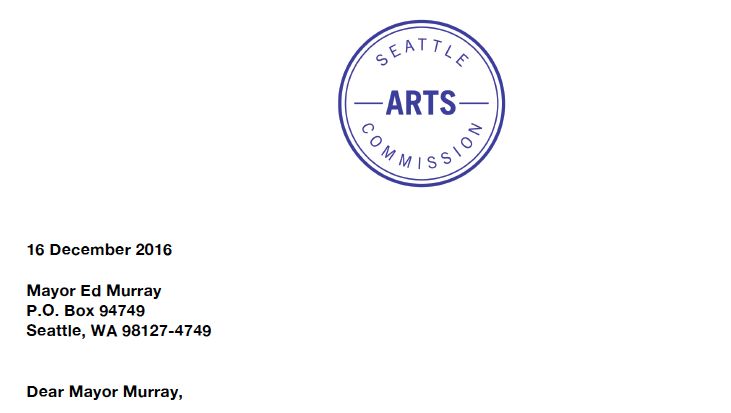In Dramatic Letter, City Arts Commission Makes Radical Recommendation to Mayor

1. The Seattle Arts Commission, the 16-member group appointed by the mayor and city council to advise the city on arts issues, co-signed a dramatic letter to Mayor Ed Murray on Friday.
In response to a lethal fire at a DIY-arts venue in Oakland earlier this month, which has led to a crackdown on fringe arts spaces in cities across the country, the arts commission, along with the Seattle Music Commission, the Capitol Hill Arts District, and the Historic Central Area Arts & Culture District, told the city that rather than closing down venues for safety violations—which would simply drive important arts communities further underground, they say—the fire department should work with DIY arts spaces to iteratively bring them up to code.
This radical point of view against “adversarial enforcement,” which posits “venues are not ‘safe’ or ‘unsafe’—they are more and less safe along a spectrum,” puts precarious venues in the context of Seattle’s escalating cost of living.

Signed by mainstream arts leaders such as Seattle Arts Commission members including SAM’s Priya Frank, Wing Luke’s Cassie Chin, ACT’s Gian-Carlo Scandiuzzi, Seattle Theater Group’s Vivian Phillips, Seattle Music Commission members including VERA’s Tim Lennon and indie rocker John Roderick, plus Capitol Hill Housing’s Michael Seiwerath, Velocity Dance Center’s Tonya Lockyer, and Historic Central Area Arts & Cultural District Leadership members including Seattle Center’s Steve Sneed and Seattle University’s Tyrone Brown, stated:
“The existence of non-permitted, non-code-compliant spaces is in part driven by the economics of space affordability in Seattle… for many who inhabit noncompliant spaces, it is not a choice to inhabit or program unsafe space, but a reality driven by economic circumstance… Adversarial enforcement merely punishes our communities for their financial inability to improve code compliance. It neither reduces noncompliant space, nor increases safety. Instead, it drives people further underground and further away from our shared goal of improving safety.”
It’s a super eloquent letter (read the whole thing here) with an insightful, yet transgressive POV like Good Samaritan and Harm Reduction efforts that prioritize inclusion and long-term stability over punitive measures.
Here’s the group's specific recommendation for the fire department:
Allow the Seattle Fire Marshal’s Office to engage with venues and producers who do not meet the minimum requirements of Seattle Fire Code. Their advice could save lives. Currently the SFMO can only advise venues to meet full code compliance. Allowing them to help venues improve incrementally will make these spaces safer. Empowering venues to become safer incrementally without fear or recrimination, including by coming to the City for support, will increase the overall safety of the public. Protocol should be modeled on Safe Haven Laws that protect those hoping to keep people safe, even if it means breaking other rules.
2. Speaking of harm reduction, a new study seconds another radical proposal, this one coming from the establishment itself (King County Executive Dow Constantine and Seattle Mayor Ed Murray) for safe drug consumption sites to deal with King County’s opioid epidemic.
Using San Francisco as a test case scenario, the new study by RTI International, published last week, found that just one safe drug site would save the city $3.5 million in health care costs.
Published in the Journal of Drug Issues, the team of researchers—from RTI, the Criminal Justice Policy Foundation, Law Enforcement Against Prohibition, the University of British Columbia’s Centre for Disease Control, and the University of Southern California—found that the supervised injection facility would prevent 3.3 cases of HIV and 19 cases of hepatitis C virus per year, reduce skin and soft tissue infection hospital stays by 415 days annually, save an average of 0.24 lives per year, and facilitate 110 people to enter medication-assisted treatment.
“While the predicted results may sound small, they are substantial for a single facility,” Kral said. “Three HIV infections is roughly 6 percent of the city’s total annual injection-related HIV infections, and we estimate that 19 HCV infections comprises roughly 3 to 5 percent of the city’s total annual injection-related HCV infections.”
The associated outcomes of the supervised injection facility would result in about $6.1 million in health savings per year. With facility operations estimated at $2.6 million per year, net savings would be roughly $3.5 million annually.
3. Seattle’s new U.S. representative-elect Pramila Jayapal (D-WA, 7) has pulled in Governor Jay Inslee, her new D.C. colleagues U.S. representatives Adam Smith (D-WA, 9), Suzan DelBene (D-WA, 1), and Derek Kilmer (D-WA, 6) along with King County Executive Dow Constantine, Seattle Mayor Ed Murray, and Seattle City Council Member Lisa Herbold for a press conference at Seattle Center this morning in response to the alarming increase in hate crimes associated with Donald Trump’s “Alt Right” presidential campaign. In Redmond, last month, for example, the greeting sign at the local mosque was defaced.
Jayapal and her elected colleagues are declaring Washington a “Hate Free State.”
“In the wake of recent events, we strongly believe it is our moral obligation to continue to fight injustice and policies rooted in racism, condemn hateful rhetoric, hate crimes and hate threats against our fellow residents,” a statement from Jayapal’s office said.
The event brings Jayapal full circle from activist to elected leader. Fifteen years ago, in the wake of 9/11, as a citizen activist, Jayapal pulled together a press conference at Seattle Center that created her soon-to-be influential non-profit civil rights group Hate Free Zone, later OneAmerica.
She organized that era’s response to hate crimes with U.S. representative Jim McDermott (D-WA, 7), the veteran, retiring congressman Jayapal’s now replacing.

